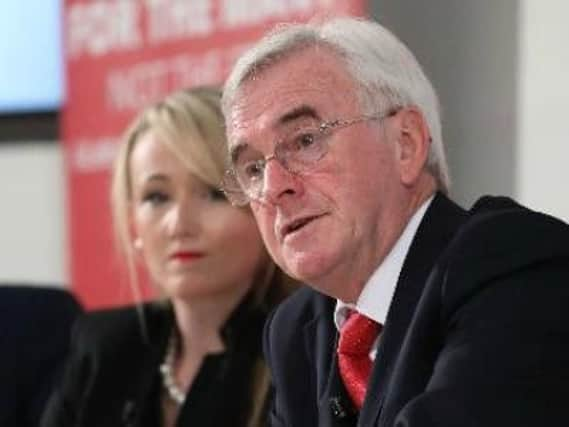John McDonnell unveils plans to take back control of controversial PFI deals


Unveiling the proposals at the party’s annual conference in Brighton, the London MP labelled the deals a “scandal” as he claimed existing contracts will cost the public sector £200bn in coming years.
However, the plans began to unravel when his second in command, shadow chief secretary to the Treasury Peter Dowd, admitted it was not yet possible to estimate what the immediate cost of the policy would be.
Advertisement
Hide AdAdvertisement
Hide AdThis prompted fierce criticism from the Conservatives, with Treasury minister Liz Truss claiming the pledge would add billions to the £253bn that Labour has already racked up since the launch of its manifesto.
Private finance initiatives have faced mounting opposition in recent years, amid complaints that public bodies are being forced to pay many times the original value of the property established under the deals over the course of the contract.
A recent analysis by the Yorkshire Post found health trusts in the region are paying out £112m a year for existing schemes, with Leeds considering entering into a new deal to fund expansion and refurbishment works.
Labour committed to not signing any new deals in its 2017 manifesto. However, addressing delegates yesterday, Mr McDonnell took this one step further by announcing a future Labour government would bring ant existing schemes “back in-house”.
Advertisement
Hide AdAdvertisement
Hide Ad“Over the next few decades, nearly £200 billion is scheduled to be paid out of public sector budgets in PFI deals,” he said. “In the NHS alone, £831 million in pre-tax profits have been made over the past six years.
“Jeremy Corbyn has made it clear that, under his leadership, never again will this waste of taxpayer money be used to subsidise the profits of shareholders, often based in offshore tax havens.
“We’ll put an end to this scandal and reduce the cost to the taxpayers.”
The proposals were welcomed by local Labour politicians with Colne Valley MP Thelma Walker, who claimed the PFI contract for the Calderdale Royal Hospital has “crippled” the trust. But there was some confusion about how the policy would be implemented and how much it would cost.
Advertisement
Hide AdAdvertisement
Hide AdSpeaking to BBC2’s Daily Politics, Mr Dowd rejected suggestions that a Labour government would have to shell out “billions and billions of pounds” upfront. However, he admitted he “[did not] believe at this stage we can say how much it will cost upfront”.
The Conservative Party suggested the policy would add “billions” to the £253bn-worth of pledges it claimed Labour has made since the election. Chief Secretary to the Treasury Liz Truss described the plans as an “unaffordable” promise that “wouldn’t improve public services”.
“Working people would pay higher taxes and we would spend more and more on debt repayments instead of public services,” she said. “It all shows that Labour just aren’t fit to govern.”
Mr McDonnell also used his keynote conference speech to reaffirm the party’s commitment to nationalisation. He told delegates: “Building an economy for the many also means bringing ownership and control of the utilities and key services into the hands of people who use and work in them. Rail, water, energy, Royal Mail – we’re taking them back.”
Advertisement
Hide AdAdvertisement
Hide AdHe also repeated the party’s commitment to building a “Crossrail for the North” and to establishing a series of Regional Development Banks to rebalance investment outside of London. “In our investment strategy, we will no longer accept the disparities between investment in London and the Home Counties and the rest of the country,” he said.
The Shadow Chancellor’s address secured a standing ovation from an enthusiastic conference hall. But it drew a scathing response from the Confederation of British Industry, which described his “vision of massive state intervention” as “the wrong plan at the wrong time”.
“Business and politicians share a determination to create a fairer society in which everyone benefits,” said director general Carolyn Fairbairn. “Forced nationalisation of large parts of British industry will send investors running for the hills, and puts misplaced nostalgia ahead of progressive vision.”